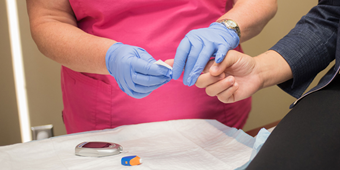Control Stress, Control Your Stroke Risk

Find Your Perfect Match
Answer a few questions and we'll provide you with a list of primary care providers that best fit your needs.
Not to add to your stress, but research is proving that stress — in your job and in your life — can increase your risk of stroke.
Stressful jobs have long been linked to increased risk for heart disease. Now a comprehensive study published in the journal Neurology finds that workplace stress also increases the risk of stroke, especially for women.
People with high-stress jobs had a 22 percent higher risk of stroke than those with low-stress jobs, the study concluded. For women, the increased risk was even higher — 33 percent. And people who felt they lacked control over their job responsibilities were at greater risk of job stress than those who had greater control.
Neurologist Esteban Cheng-Ching, MD, of Premier Health’s Clinical Neuroscience Institute believes job stress for women can be compounded by the competing demands of work and family life.
Get help from a professional when stress gets to a point you have a hard time handling it.
“Common signs of stress are feeling like you have no control of your job situation and your family situation,” he says. “Or conversely, feeling you have too much control, that everything is on your shoulders.
“Stress can come from work life, personal life, health issues, financial concerns. Women tend to want to take care of everything.”
Self Care Lowers Women’s Stroke Risk
He said that studies have shown that significant stress can lead to depression or anxiety, which further raises the risk of stroke.
“It’s a very high priority for women to take care of themselves so they can take care of all the issues and people in their life,” Dr. Ching advises. “Taking care of yourself means getting enough sleep, eating a good diet, increasing physical activity and exercise. And I counsel women against dealing with stress in an unhealthy way, such as smoking, or drinking, or overeating.”
Get Help When You Need It
In addition, Dr. Ching advises reaching out to friends and family when you feel stressed by life’s demands. “Talk with friends and family members who can help you. And if you need it, get help from a professional when stress gets to a point you have a hard time handling it.
“There’s help out there. Women shouldn’t feel they don’t have anywhere to turn.”
He said that he refers patients struggling with stress and life’s issues to professional counselors “who can help them understand their stress and deal with it in a constructive way.”
He adds, “One of the fastest growing populations for stroke is young adults, under 45, and more and more of them are women, so that’s a big concern. We’re dealing with stroke in younger populations that are still at a point in their lives when they need to have a career and are managing a family, possibly small children.”
Stroke Signs Differ for Women
Dr. Ching also advises his female patients that women can experience unique stroke symptoms, compared to men. These can include confusion, behavioral changes, nausea and vomiting.
“Sometimes, recognition of symptoms and treatment are delayed for women,” he said. He recommends the acronym BE FAST, for balance, eyes, face, arms, speech and time. “So, if you have balance problems, vision changes, a facial droop, or your arms are weak when you hold them up, or your speech changes, it’s time to call 911.”
Find Your Perfect Match
Answer a few questions and we'll provide you with a list of primary care providers that best fit your needs.
Source: Esteban Cheng-Ching, MD, Premier Health Clinical Neuroscience Institute; Stanford Medicine





